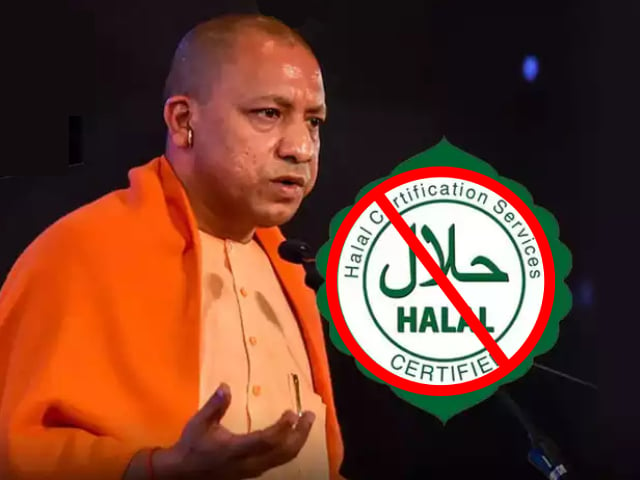
Bareilly: After state government’s decision earlier this week to enact a statewide ban on the “production, storage, distribution and sale of food items with halal certification“, Maulana Shahabuddin, a cleric from Aala Hazrat Dargah which has a large following across the country, welcomed the move on Thursday.
Shahabuddin said, “Halal certificate doesn’t fulfill ‘Sharia’ guidelines and is a smart marketing tool to boost the product sales by tricking consumers.
People with such certificates are only making money and cheating the minority community. Halal certificates are normally given to non-veg items but some people are using ‘halal tag’ for honey, biscuits, vegetables and other products which is absolutely wrong.”
“People shouldn’t get confused and think it’s a move against them by the government. I would also urge the state authorities not to harass meat-sellers who already have registration certificates issued by the government. The government should constitute a body on halal food with people who have some knowledge in ‘Sharia’. In Arab nations where the food (mainly meat) is imported from other places, they use the halal tag. There is no need for it in India,” he added. Notably, after the ban on halal-certified products, officials of the State Food Safety and Drug Administration, a regulatory body, along with the local police started a major crackdown on such products in various districts. Many of these products were seized from shops in Kheri on Tuesday, among the several other raids in UP.
Assistant commissioner (food and safety-2nd), Chandrashekhar Mishra, who is based in Shahjahanpur, said, “Food licence, also known as the FSSAI licence, is provided to the manufacturer, traders and restaurants carrying out food manufacturing or processing units. The halal certification was creating confusion about quality of other food items which is why government banned it. We are conducting raids to ensure such items are removed from the market.”
The Yogi Adityanath-led government in Uttar Pradesh has banned the production, storage, distribution, and sale of food products with halal certification. However, the ban does not apply to export products. The government alleges a conspiracy to discourage non-halal products and create financial benefits. Animal slaughter in the name of sacred rituals, particularly halal, is prevalent, leading to the ban. It includes medicines, medical devices, and cosmetics. Opinions on the ban vary, with some supporting it to break religious monopolies, while others express concerns about economic influences, bans on Hindu eateries, hygiene, and religious practices.
The Uttar Pradesh government has banned the production, storage, distribution, and sale of food products with halal certification. The ban exempts products manufactured for export. The government alleges that the use of products without halal certification seeks unfair financial benefits and is part of a pre-planned strategy by anti-national elements. Strict legal measures will be taken against individuals or firms engaged in the production and sale of halal-certified medicines, medical devices, and cosmetics. Muslim groups endorse halal certification while Hindu groups boycott it.
Source: TOI

 Shiv Sena leader demands action against Bigg Boss OTT 3 over ‘obscene’ content
Shiv Sena leader demands action against Bigg Boss OTT 3 over ‘obscene’ content Conduct a thorough enquiry of individuals coming to Vishalgad Fort from Hyderabad involved in distributing money to the local Muslims : Ramesh Shinde, HJS
Conduct a thorough enquiry of individuals coming to Vishalgad Fort from Hyderabad involved in distributing money to the local Muslims : Ramesh Shinde, HJS Kalki 2898 AD: Legal notice served to team for allegedly hurting Hindu sentiments
Kalki 2898 AD: Legal notice served to team for allegedly hurting Hindu sentiments NGO worker distributes books on Jesus to the school students in Vidisha (MP)
NGO worker distributes books on Jesus to the school students in Vidisha (MP) Kanwar Yatra: SC stays U.P., Uttarakhand directives to display names of food stall owners and staff en route
Kanwar Yatra: SC stays U.P., Uttarakhand directives to display names of food stall owners and staff en route No one will be treated unfairly; all encroachments on Vishalgad will be removed – Maharashtra CM’s Assurance
No one will be treated unfairly; all encroachments on Vishalgad will be removed – Maharashtra CM’s Assurance